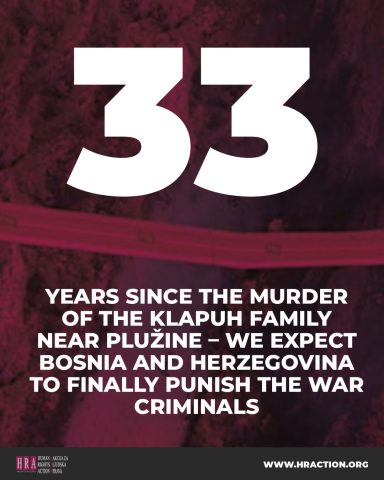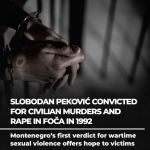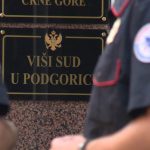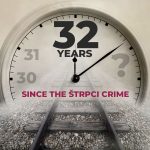
TIME FOR A CLEAR DISTANCE FROM WAR CRIMINALS
06/07/2025
STUDY VISIT TO SARAJEVO FOR THE IMPROVEMENT OF WAR CRIMES PROSECUTION AND STRENGTHENING VICTIM PROTECTION IN MONTENEGRO
07/07/202533 YEARS SINCE THE MURDER OF THE KLAPUH FAMILY NEAR PLUŽINE – WE EXPECT BOSNIA AND HERZEGOVINA TO FINALLY PUNISH THE WAR CRIMINALS

Today marks 33 years since the murder of three civilians, Hasan, Ferida and their daughter Sena Klapuh, who fled war-torn Foča in Bosnia and Herzegovina to Montenegro in 1992.
They were brutally killed by members of the Army of the Republika Srpska on July 6, 1992, near Plužine, on the Obrad Cicmil Bridge over the Piva River.
The Human Rights Action expects the competent institutions of Bosnia and Herzegovina to take measures to bring Zoran Vuković and Radomir Kovač to justice, who were convicted in Montenegro in 1996 for this crime.
We also support the appeal of Podgorica City Assembly councilor Aleksandar Saša Zeković that the remains of the victims be immediately handed over to a family member upon identification with appropriate state honors.
***
Hasan Klapuh, his wife Ferida and their daughter Sena were killed by four members of the “Dragan Nikolić” detachment of the Army of Republika Srpska, who had previously agreed to safely transport them from Bosnia and Herzegovina to Montenegro for a financial fee. For this murder, qualified as a war crime against civilians, Janko Janjić, Radomir Kovač, Zoran Simović, and Zoran Vuković were definitively sentenced in Montenegro in 1996 to 20 years in prison each, while their accomplice Vidoje Golubović was sentenced to eight months for failing to report the crime and perpetrators. Vidoje Golubović was the only one to serve the sentence. The others were tried in absentia because they were fugitives.
The court established that after crossing the border and arriving near Plužine, close to the Mratinje Dam on the Piva River, the accused took the victims out of the vehicle, shot them, and pushed them off a bridge about 100 meters high. Autopsy findings showed that Ferida and Sena were still alive for some time after being wounded.
Despite the quick discovery of this brutal crime, justice has never been served – the four convicted in absentia have not served a single day of their sentences. Simović and Janjić have since died, while Kovač and Vuković still live freely in Foča today.
Bosnia and Herzegovina should take measures to prosecute them because their involvement in the crime was clearly proven before the Montenegrin court supported by material evidence. There are no legal obstacles for this since the European Convention on the Transfer of Proceedings in Criminal Matters (Article 8) allows Bosnia and Herzegovina to take over the case and retry them, as both are citizens of Bosnia and Herzegovina.
Kovač and Vuković can only be brought to justice by being retried in Bosnia and Herzegovina because they cannot serve the sentence imposed in Montenegro based on trials held in absentia in Bosnia and Herzegovina, and Bosnia and Herzegovina cannot extradite its citizens convicted of war crimes to Montenegro.
Human Rights Action published an article this year titled “Ne bis in idem in the context of competing international jurisdictions”, where legal experts Amir Čengić and Lejla Terzimehić analyzed the legal conditions for enforcing the final judgment in this case and proposed concrete solutions for achieving justice. The article was published as part of the project “Together to Justice – legal, psychological and social support to victims of war crimes,” implemented by Human Rights Action with support from the European Union within the regional project “EU Support for Confidence Building in the Western Balkans,” implemented by the United Nations Development Programme (UNDP).
A dignified burial:
In 1992, the Municipality of Nikšić temporarily buried the victims’ remains near Trebjese without any grave markers. After years of appeals from the victims’ son and brother, Ferid Klapuh, as well as initiatives from Montenegro’s civil sector, the first concrete steps toward exhumation, identification, and dignified burial have finally been taken. On June 4, 2025, the Missing Persons Commission of Montenegro, at the request of the Institute for Missing Persons of Bosnia and Herzegovina, took bone samples from the temporary cemetery in Trebjese for DNA analysis. Samples were sent to the laboratory of the International Commission on Missing Persons (ICMP) in The Hague, and results are expected soon.
The remains of three individuals – two women and one man – were found at the site and transferred to the Clinical Center of Montenegro, where they will be kept until the DNA analysis is completed.
A dignified farewell to the remains of the Klapuh family members from Montenegro would be significant for Montenegrin society as a whole. Recognizing and honoring the Klapuh family victims is part of the process of achieving justice and responsible community attitude towards past crimes.







 English
English